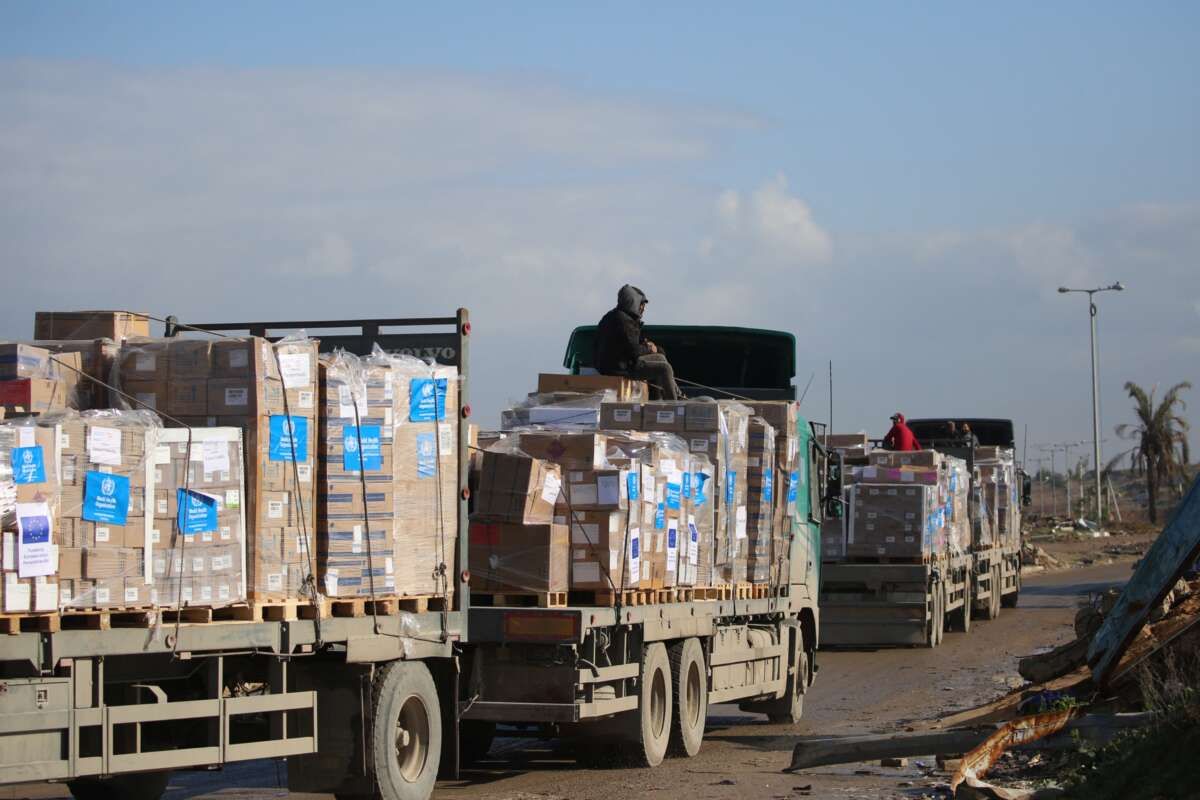Truthout is an indispensable resource for activists, movement leaders and workers everywhere. Please make this work possible with a quick donation.
Hamas officials have said that the group has agreed to release Israeli hostages on time this weekend amid fears that the ceasefire deal in Gaza would fall apart as Israel has repeatedly violated the ceasefire numerous times.
The group said on Thursday that it “confirms continuation in implementing the agreement in accordance with what was signed, including the exchange of prisoners according to the specified timetable.” This reportedly followed discussions with mediators of the negotiation regarding Israel’s withholding of certain crucial types of aid from Gaza.
The deal stipulates that Hamas is supposed to release three Israeli captives on Saturday, while Israel is set to release yet more Palestinian prisoners. Israel has demanded that Hamas release live captives, with roughly half of the remaining captives believed by Israel to be dead.
Earlier this week, Hamas said that it was going to withhold the captives unless Israel stopped committing ceasefire violations. Israel has still been killing Palestinians in Gaza and preventing them from returning to their homes, the group said.
Indeed, Euro-Med Human Rights Monitor said this week that Israel has killed at least 110 Palestinians in Gaza since the ceasefire was enacted — an average of six killings per day.
Further, Hamas said that Israel has been blocking humanitarian aid from entering the Strip despite Israel’s obligations under the agreement for a surge of aid trucks.
Under the deal, Israel is supposed to allow 600 trucks with aid and supplies to cross the border each day. This includes resources like food, shelter and heavy equipment to allow Palestinians to clear rubble and retrieve bodies from under the rubble.
But officials and human rights groups have said that Israel has not fulfilled this part of the deal. Officials have said that Israel is blocking the entry of shelter and has only allowed the entry of 10 percent of the 200,000 tents it’s supposed to allow in. Israeli officials have disputed that, saying that it has allowed in at least 30,000 tents.
On Thursday, Palestinians and mediators reported a surge of aid into Gaza, seemingly as a response to Hamas’s demands. Israel had threatened to resume the bombings and attacks if Hamas didn’t release the captives.
Al Jazeera reported an increase of food and fuel, as some groups have reported that Israel has been allowing food for vendors and not for aid reasons. However, Israel is still not allowing in heavy machinery, which is crucial for maintaining the deal and for Palestinians to begin to rebuild.
Some Israeli officials are reportedly still threatening to resume their assault after all of the Israeli captives are released, as Israeli Prime Minister Benjamin Netanyahu has previously said. Hamas said earlier this month that talks on the second phase, set to begin in early March, have begun, but substantial progress has not yet been made. At the same time, President Donald Trump’s threat to forcibly expel Palestinians from Gaza and wage a U.S. takeover in recent days has caused concerns over the longevity of the ceasefire deal.
A terrifying moment. We appeal for your support.
In the last weeks, we have witnessed an authoritarian assault on communities in Minnesota and across the nation.
The need for truthful, grassroots reporting is urgent at this cataclysmic historical moment. Yet, Trump-aligned billionaires and other allies have taken over many legacy media outlets — the culmination of a decades-long campaign to place control of the narrative into the hands of the political right.
We refuse to let Trump’s blatant propaganda machine go unchecked. Untethered to corporate ownership or advertisers, Truthout remains fearless in our reporting and our determination to use journalism as a tool for justice.
But we need your help just to fund our basic expenses. Over 80 percent of Truthout’s funding comes from small individual donations from our community of readers, and over a third of our total budget is supported by recurring monthly donors.
Truthout has launched a fundraiser, and we have a goal to add 182 new monthly donors in the next 24 hours. Whether you can make a small monthly donation or a larger one-time gift, Truthout only works with your support.
